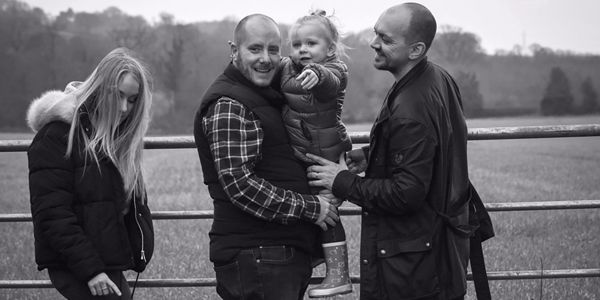If a biological baby is all you’ve dreamed of, but you cannot conceive or carry a pregnancy yourself, surrogacy or adoption may be an option for you. In the next couple of pages, we will be looking at the differences between the types of surrogacies, as well as the different ways to go about adopting a child.
Surrogacy
A surrogate is a woman who is willing and able to go through the pregnancy with your biological baby - so your egg and partner’s sperm/your partner’s sperm and a donor egg/your egg and donor sperm. The main downside to this is the complex legal issues, and possible emotional aspect of a surrogate pregnancy. In the UK, the surrogate woman, regardless of who’s egg or sperm made the baby, is deemed the legal mother of the baby. Therefore, they can keep the baby if that is what they decide. Surrogacy contracts are not enforced here in the UK, and surrogates will have to sign a parental order after birth, transferring parental rights to you, and a new birth certificate will be issued.
There are three types of surrogacies:
- Gestational surrogacy
- Traditional surrogacy
- Reciprocal IVF
Gestational Surrogacy
When a woman carries a baby that is not genetically related to her, is an option if you have viable eggs but cannot carry the pregnancy yourself for any reason. The egg and sperm are combined in-vitro (IVF) and transferred into the gestational carrier’s uterus.
Traditional Surrogacy
This is when the sperm from the male partner of an infertile couple is inseminated into a surrogate, with luck, resulting in a pregnancy. This can also be achieved through IVF. The couple then, through a parental order, become the baby’s legal parents once it is born. This is a good option if you don’t have any viable eggs or cannot carry the pregnancy yourself, but still want a biological relation to your partner.
Reciprocal IVF
This is when eggs are taken from one partner, combined with donor sperm, and transferred into the other partner through IVF, giving both women the knowledge that the baby is theirs, whether biologically, or grown inside them.
Choosing a surrogate can seem daunting, especially if it’s a stranger. They’ll be between 21 and 45, healthy, have a support bubble around them, and understands the process fully. You can also go through non-profit agencies to find a surrogate in the UK. They can do all the pre-screening for you; help you find specialist lawyers and guide you through everything. If you choose a friend or family member to be your surrogate, rather than finding one through an agency, once all the mental health evaluations are concluded, legal bits are done and you’ve decided what route you want to go down - IUI/IVF/AI, you'll want to hash out all the costs. The total cost for surrogacy in the UK can range from £20-60,000 and includes surrogate expenses, fertility costs, agency fees and legal fees (2021).
Adoption
If surrogacy and fertility treatments are not an option, there are over 78,000 children in England alone in need of a loving family. Almost anyone over the age of 21 can adopt a child, single, married, divorced, same-sex couples, anyone! Provided you have a fixed permanent residence in the UK and have lived here for a minimum of 1 year - meaning you don’t have to be a British citizen to adopt.
There are two ways you can adopt a child in the UK - through a council approved agency, or through a voluntary agency. The agencies can help guide you through the whole process, the legalities, and the screening process. During the screening, you will have to undergo several assessments to test your suitability for adoption, a full criminal background check, medical exam, and will need to provide 3 referees who can testify to your character. One of these referees can be a relative.
If you pass, the process of finding a suitable child can begin. This process can take around 6 months, after which, a child will be matched with you for adoption. There are children in the system from newborn to aged 17, all longing for a home and family. To make the adoption legally binding, you, or yourself and your partner can apply for an adoption court order, which grants you full parental rights and responsibilities for your adopted child.
Adopting Stepchildren
You are also able to adopt a stepchild as your own. You must first inform the local council of your intent, and within 3 months, apply for the court order. Your stepchild must have lived with you for a minimum of 6 months. Like the adoption process, you must first go through an assessment and provide a report from a social worker on your partner, the child and the child’s other birth parent. The adoption order then cancels out any other order or arrangement that gives the other birth parent rights or access to the child.
Overseas Adoption
Adopting a child from overseas is also possible in the UK and can be done through your local council or through a voluntary adoption agency that specifically deals with overseas adoption. This is only possible if the child is not safe in their country of origin, and there is proof that the adoption would be in their best interests.
You must also be cleared by a UK adoption agency as suitable to adopt a child from overseas. The process is like UK adoption; however, the agency may charge a fee. In addition, your assessment will be sent to the overseas adoption agency. Your adoption application will then be sent to the child’s country of origin, and you will have to go and visit them. The agency will guide you through every step of the way.
The Department of Education will also charge a flat fee for case management and processing. There may also be restrictions on adopting from certain countries, so it's worth checking online for the up-to-date list. For adoptions taking place in one of the restricted countries, you will need to apply to the Inter-country Adoption Team.
Funding is also available from the ‘Adoption Support Fund’, which provides therapy for adoptive children and their adopting families, to help you settle in together, build confidence, and manage behaviours.







